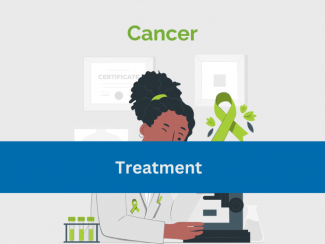Cancer is a group of diseases characterised by out-of-control cell growth. There are more than 100 different types of cancer. The cancer is named after the area of the body or organ where it originates.

The options depend on the type of cancer, how far it has spread, age, lifestyle and the health status of the patient. There is no single treatment for cancer and doctors often combine different types of treatment.
- Surgery - Surgery is the oldest known method of treating cancer. Surgery is quite effective if the cancer has not spread or metastasised. Surgery is often combined with other forms of therapy, like radiotherapy and chemotherapy.
- Chemotherapy - Chemotherapy is generally used when the cancer has spread (metastasised) to other parts of the body. The aim of chemotherapy is to kill the cancer cells or stop them from growing. To do this, the cancer cells are treated with drugs (either pills or intravenous drugs) that interfere with the cell division process. The problem is that these drugs can harm normally rapid growing cells also. Chemotherapy is undertaken in cycles so that the body gets recovery time between cycles. Chemotherapy has lots of side effects, like nausea, vomiting, appetite change, pain, hair loss, anaemia and fatigue.
- Radiation therapy - High-energy rays and other charged particles are used to kill cancer cells by damaging their DNA. Radiotherapy can cure cancer if the cancer is localised. Radiation therapy can be used in combination with other cancer treatments to prevent recurrence of the primary malignant tumour (as in early stages of breast cancer). Side effects include skin changes like dryness, peeling or blistering, fatigue, plus other side effects depending on the part of the body being treated.
- Targeted Therapy - Drugs are used to target cancer-specific genes or proteins without harming normal cells.
- Immunotherapy - Immunotherapy aims to get the body’s immune system to fight the tumour. It works by pumping up the body’s immune system to attack cancer cells or by injecting a man-made immune system protein.
- Gene Therapy - This is still a new therapy. The goal of gene therapy is to repair or replace damaged genes in cancer cells.
- Stem cell transplant – This therapy is used to replace diseased or damaged bone marrow with normal cells. It is used to treat leukaemia, lymphoma and other blood related cancers.
- Palliative Care – It is indicated for pain management, symptom control, and emotional support in advanced cancer. Based on patient’s condition it is given along with the radiotherapy or chemotherapy. It helps to improve quality of life of cancer patients.
Know more on holistic approach for cancer treatment:
Changed
26/Apr/2024
Community
Condition















